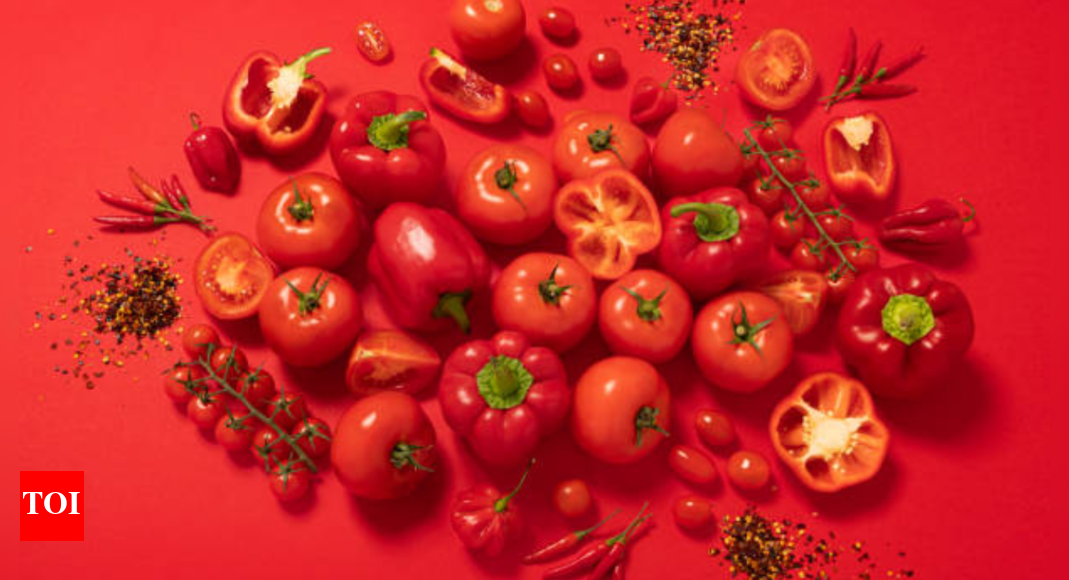When it comes to heart health, not all heroes wear white lab coatsSome are red, juicy, and sitting right in your fridge. Yep, we’re talking about red superfoods. These naturally vibrant foods aren’t just pretty on the plate—they’re packed with antioxidants, nutrients, and anti-inflammatory goodness that can seriously reduce your risk of heart disease.If you’ve been told to “eat the rainbow,” think of the red section as the bold, brave heart defender. Here’s your cheat sheet to the five red superfoods your heart secretly wishes you’d eat more often.
Tomatoes
Tomatoes are the real heroes when it comes to heart-loving foods. They’re rich in lycopene, a powerful antioxidant that gives tomatoes their signature red hue and helps reduce LDL cholesterol (the bad kind), prevent plaque buildup, and lower blood pressure.Whether you like them raw in salads, roasted in pasta, or blended into a spicy chutney—just get them in. Bonus tip: Cooking tomatoes actually boosts lycopene absorption, so don’t shy away from that homemade tomato soup or slow-roasted pasta sauce.And if you’re still avoiding tomatoes because someone told you they’re “too acidic,” it’s time to rethink that. Your heart is definitely a team tomato.
Beets
Beets are basically the cool kids of the veggie world. They’re trendy in smoothies, earthy in salads, and somehow manage to look like art when sliced. But underneath their sweet, earthy flavor lies serious heart-healthy magic.Beets are loaded with nitrates, which the body converts into nitric oxide—a natural compound that helps relax blood vessels and improve blood flow. That means lower blood pressure, better circulation, and a heart that’s not overworked.Plus, beets are rich in folate, fiber, and potassium—all nutrients that support cardiovascular health. Pro tip: Beetroot juice before a workout? It may give your stamina and your heart a little extra push.
Red apples
An apple a day might actually keep the cardiologist away—especially if it’s a red one. Red apples are rich in flavonoids, especially quercetin, which helps reduce inflammation and prevent blood clots.They also contain soluble fiber (hello, pectin!), which can help lower cholesterol levels by binding with cholesterol in the gut and flushing it out. The skin is where most of the magic is, so don’t peel them!Eating apples regularly has also been linked to lower risk of stroke and reduced blood pressure. So snack away—just maybe skip the caramel dip if you’re doing it for your heart.
Red grapes
Red grapes—especially the ones with seeds—are loaded with resveratrol, a compound that’s been linked to improved heart function, reduced inflammation, and even better blood vessel flexibility.This is the same antioxidant that gives red wine its reputation as a heart-helper (in moderation, of course). But you don’t need to pour a glass of merlot every night—eating whole red grapes gives you the fiber and natural sugar balance that wine doesn’t offer.Resveratrol helps protect the inner lining of arteries and reduce oxidative stress, which is one of the culprits behind heart disease. Just a handful of grapes a few times a week can be your heart’s sweet little secret weapon.
Strawberries
Strawberries are more than just summer’s favorite fruit—they’re a full-blown heart-healthy superfood. Rich in vitamin C, polyphenols, and anthocyanins (those pigments that make them red), strawberries help reduce inflammation, boost good cholesterol (HDL), and lower blood pressure.A study from Harvard even found that people who ate more than three servings of strawberries or blueberries a week had a 32% lower risk of heart attack. That’s huge for a fruit that fits in your palm.Toss them into smoothies, sprinkle them on oats, or just eat them straight—these berries are a sweet way to support a strong heart without ever feeling like you’re eating “health food.”
Go Red for a reason
So next time you’re grocery shopping, don’t just pass by the red section of the produce aisle—lean into it. These naturally crimson foods are like edible love letters to your heart. They work behind the scenes to improve blood flow, regulate cholesterol, lower blood pressure, and fight off inflammation like pros.The best part? They taste amazing and don’t require fancy recipes. Just add, mix, roast, or eat raw. Your heart doesn’t need complicated—it just needs you to eat smart.
var _mfq = window._mfq || [];
_mfq.push([“setVariable”, “toi_titan”, window.location.href]);
!(function(f, b, e, v, n, t, s) {
function loadFBEvents(isFBCampaignActive) {
if (!isFBCampaignActive) {
return;
}
(function(f, b, e, v, n, t, s) {
if (f.fbq) return;
n = f.fbq = function() {
n.callMethod ? n.callMethod(…arguments) : n.queue.push(arguments);
};
if (!f._fbq) f._fbq = n;
n.push = n;
n.loaded = !0;
n.version = ‘2.0’;
n.queue = [];
t = b.createElement(e);
t.async = !0;
t.defer = !0;
t.src = v;
s = b.getElementsByTagName(e)[0];
s.parentNode.insertBefore(t, s);
})(f, b, e, ‘https://connect.facebook.net/en_US/fbevents.js’, n, t, s);
fbq(‘init’, ‘593671331875494’);
fbq(‘track’, ‘PageView’);
};
function loadGtagEvents(isGoogleCampaignActive) {
if (!isGoogleCampaignActive) {
return;
}
var id = document.getElementById(‘toi-plus-google-campaign’);
if (id) {
return;
}
(function(f, b, e, v, n, t, s) {
t = b.createElement(e);
t.async = !0;
t.defer = !0;
t.src = v;
t.id = ‘toi-plus-google-campaign’;
s = b.getElementsByTagName(e)[0];
s.parentNode.insertBefore(t, s);
})(f, b, e, ‘https://www.googletagmanager.com/gtag/js?id=AW-877820074’, n, t, s);
};
function loadSurvicateJs(allowedSurvicateSections = []){
const section = window.location.pathname.split(‘/’)[1]
const isHomePageAllowed = window.location.pathname === ‘/’ && allowedSurvicateSections.includes(‘homepage’)
const ifAllowedOnAllPages = allowedSurvicateSections && allowedSurvicateSections.includes(‘all’);
if(allowedSurvicateSections.includes(section) || isHomePageAllowed || ifAllowedOnAllPages){
(function(w) {
function setAttributes() {
var prime_user_status = window.isPrime ? ‘paid’ : ‘free’ ;
var geoLocation = window?.geoinfo?.CountryCode ? window?.geoinfo?.CountryCode : ‘IN’ ;
w._sva.setVisitorTraits({
toi_user_subscription_status : prime_user_status,
toi_user_geolocation : geoLocation
});
}
if (w._sva && w._sva.setVisitorTraits) {
setAttributes();
} else {
w.addEventListener(“SurvicateReady”, setAttributes);
}
var s = document.createElement(‘script’);
s.src=”https://survey.survicate.com/workspaces/0be6ae9845d14a7c8ff08a7a00bd9b21/web_surveys.js”;
s.async = true;
var e = document.getElementsByTagName(‘script’)[0];
e.parentNode.insertBefore(s, e);
})(window);
}
}
window.TimesApps = window.TimesApps || {};
var TimesApps = window.TimesApps;
TimesApps.toiPlusEvents = function(config) {
var isConfigAvailable = “toiplus_site_settings” in f && “isFBCampaignActive” in f.toiplus_site_settings && “isGoogleCampaignActive” in f.toiplus_site_settings;
var isPrimeUser = window.isPrime;
var isPrimeUserLayout = window.isPrimeUserLayout;
if (isConfigAvailable && !isPrimeUser) {
loadGtagEvents(f.toiplus_site_settings.isGoogleCampaignActive);
loadFBEvents(f.toiplus_site_settings.isFBCampaignActive);
loadSurvicateJs(f.toiplus_site_settings.allowedSurvicateSections);
} else {
var JarvisUrl=”https://jarvis.indiatimes.com/v1/feeds/toi_plus/site_settings/643526e21443833f0c454615?db_env=published”;
window.getFromClient(JarvisUrl, function(config){
if (config) {
const allowedSectionSuricate = (isPrimeUserLayout) ? config?.allowedSurvicatePrimeSections : config?.allowedSurvicateSections
loadGtagEvents(config?.isGoogleCampaignActive);
loadFBEvents(config?.isFBCampaignActive);
loadSurvicateJs(allowedSectionSuricate);
}
})
}
};
})(
window,
document,
‘script’,
);
#Heart #Disease #Prevention #Foods #red #superfoods #reduce #heart #disease #risk



